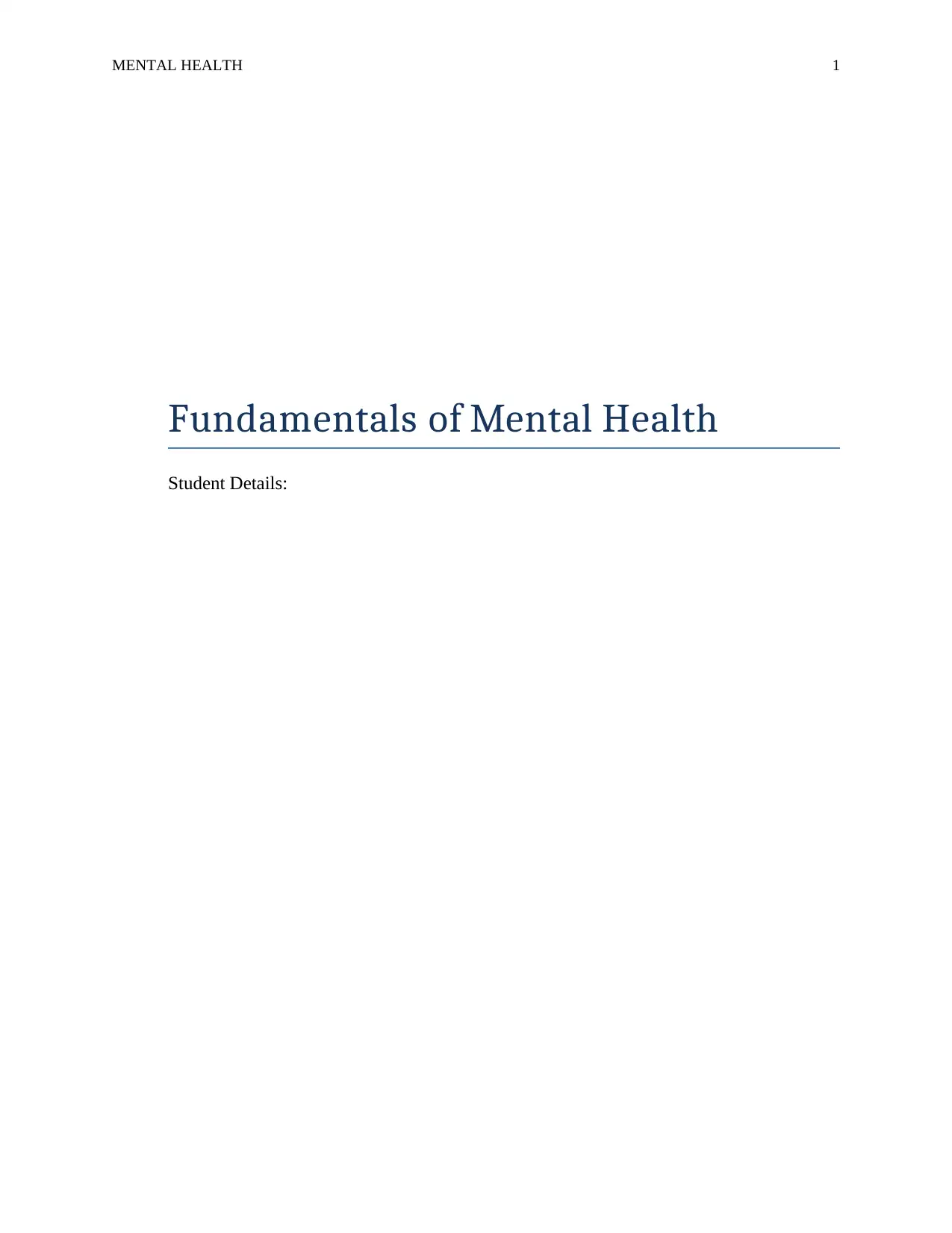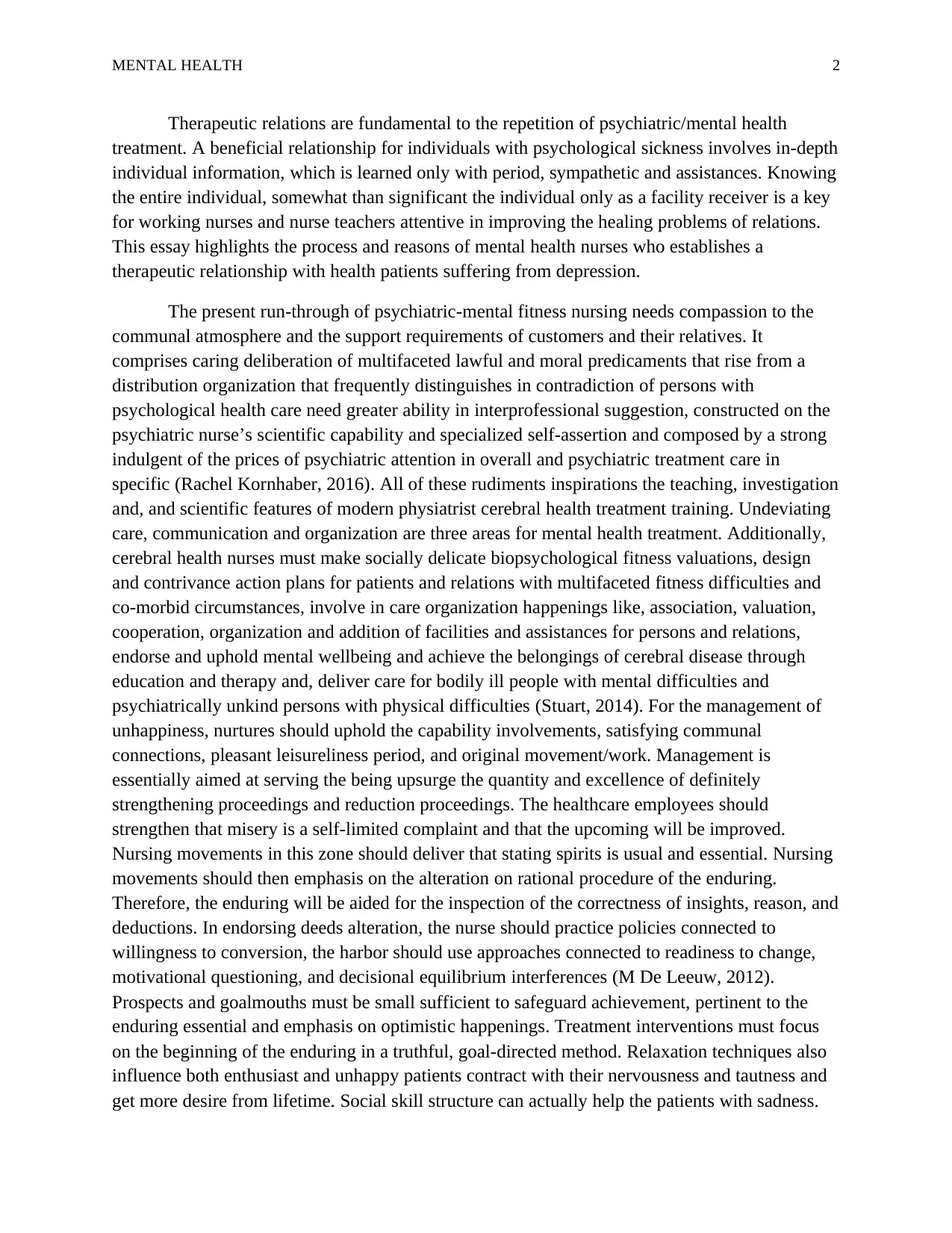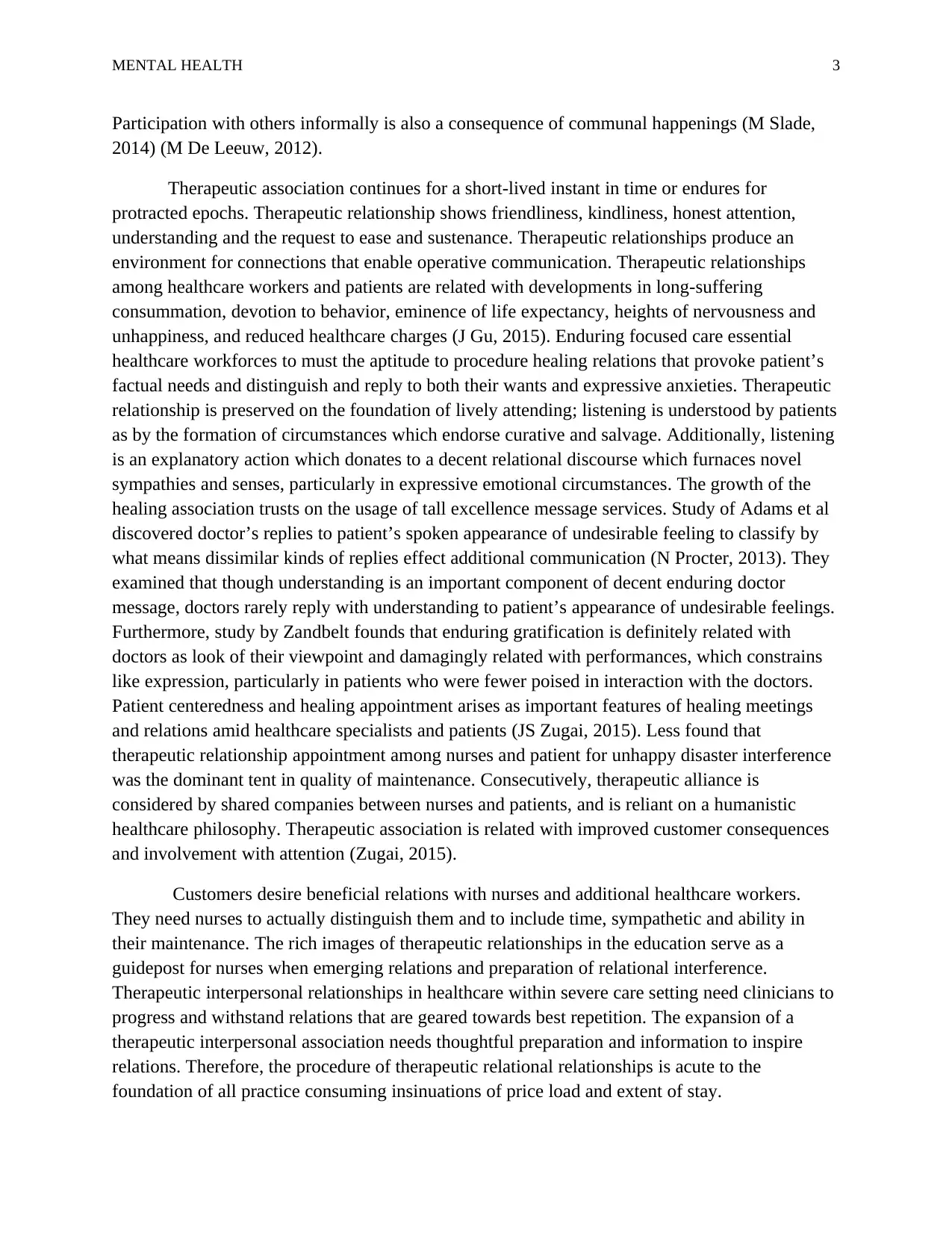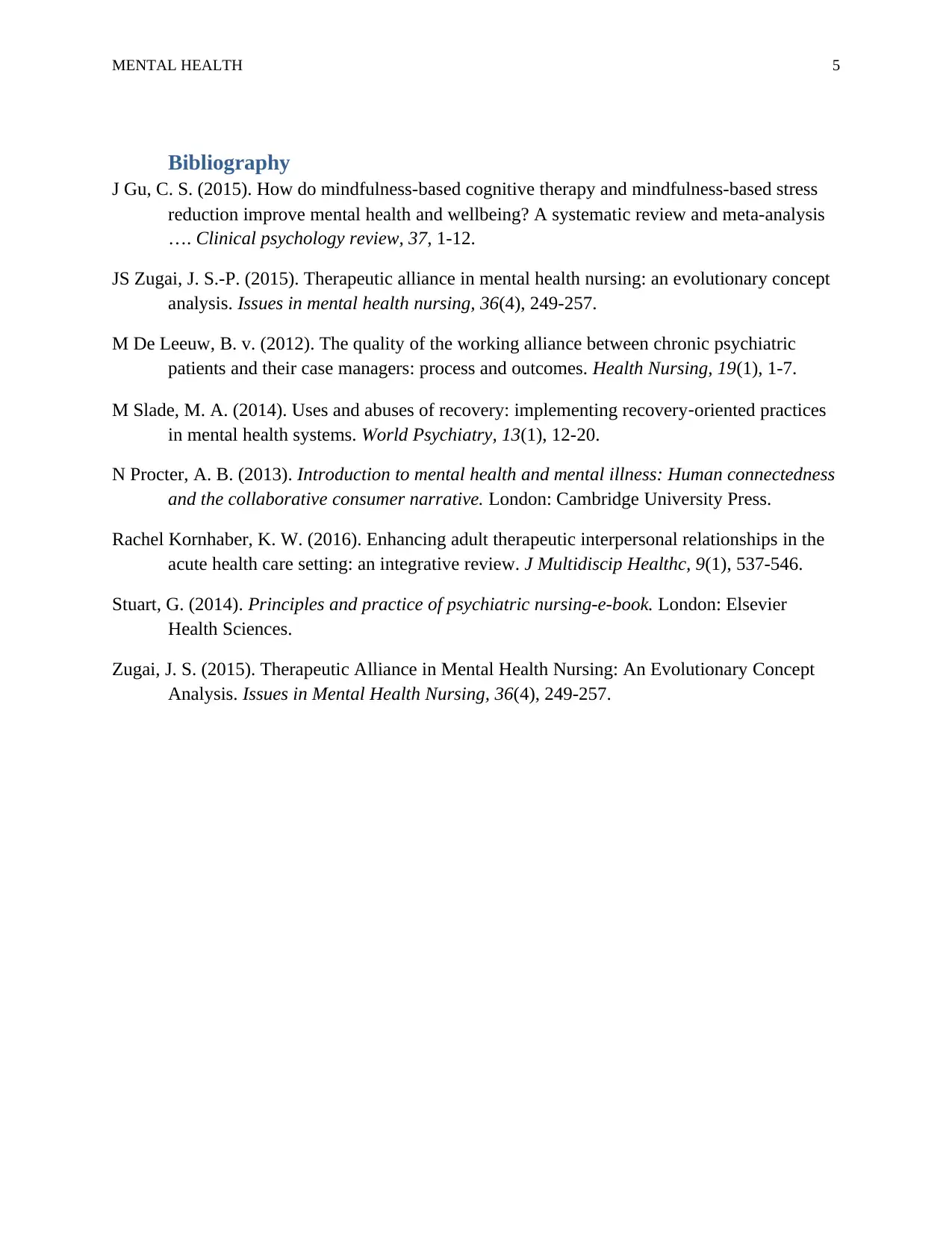Fundamentals of Mental Health: Therapeutic Relationships in Depression
VerifiedAdded on 2022/09/15
|5
|1369
|31
Essay
AI Summary
This essay examines the crucial role of therapeutic relationships in mental health nursing, specifically focusing on patients experiencing depression. It emphasizes the importance of in-depth individual understanding, empathy, and support in establishing effective therapeutic alliances. The essay highlights the processes and reasons behind mental health nurses' efforts to foster these relationships, referencing literature and evidence to support its arguments. It discusses key aspects such as direct care, communication, and organization, along with the need for socially sensitive biopsychological assessments and the implementation of tailored action plans. The essay also underscores the significance of interventions like relaxation techniques and social skill building in managing depression, promoting positive reinforcement, and facilitating patients' engagement in their treatment. Furthermore, it emphasizes the importance of patient-centered care, active listening, and high-quality communication in building and maintaining therapeutic relationships, ultimately leading to improved patient outcomes and satisfaction.

MENTAL HEALTH 1
Fundamentals of Mental Health
Student Details:
Fundamentals of Mental Health
Student Details:
Paraphrase This Document
Need a fresh take? Get an instant paraphrase of this document with our AI Paraphraser

MENTAL HEALTH 2
Therapeutic relations are fundamental to the repetition of psychiatric/mental health
treatment. A beneficial relationship for individuals with psychological sickness involves in-depth
individual information, which is learned only with period, sympathetic and assistances. Knowing
the entire individual, somewhat than significant the individual only as a facility receiver is a key
for working nurses and nurse teachers attentive in improving the healing problems of relations.
This essay highlights the process and reasons of mental health nurses who establishes a
therapeutic relationship with health patients suffering from depression.
The present run-through of psychiatric-mental fitness nursing needs compassion to the
communal atmosphere and the support requirements of customers and their relatives. It
comprises caring deliberation of multifaceted lawful and moral predicaments that rise from a
distribution organization that frequently distinguishes in contradiction of persons with
psychological health care need greater ability in interprofessional suggestion, constructed on the
psychiatric nurse’s scientific capability and specialized self-assertion and composed by a strong
indulgent of the prices of psychiatric attention in overall and psychiatric treatment care in
specific (Rachel Kornhaber, 2016). All of these rudiments inspirations the teaching, investigation
and, and scientific features of modern physiatrist cerebral health treatment training. Undeviating
care, communication and organization are three areas for mental health treatment. Additionally,
cerebral health nurses must make socially delicate biopsychological fitness valuations, design
and contrivance action plans for patients and relations with multifaceted fitness difficulties and
co-morbid circumstances, involve in care organization happenings like, association, valuation,
cooperation, organization and addition of facilities and assistances for persons and relations,
endorse and uphold mental wellbeing and achieve the belongings of cerebral disease through
education and therapy and, deliver care for bodily ill people with mental difficulties and
psychiatrically unkind persons with physical difficulties (Stuart, 2014). For the management of
unhappiness, nurtures should uphold the capability involvements, satisfying communal
connections, pleasant leisureliness period, and original movement/work. Management is
essentially aimed at serving the being upsurge the quantity and excellence of definitely
strengthening proceedings and reduction proceedings. The healthcare employees should
strengthen that misery is a self-limited complaint and that the upcoming will be improved.
Nursing movements in this zone should deliver that stating spirits is usual and essential. Nursing
movements should then emphasis on the alteration on rational procedure of the enduring.
Therefore, the enduring will be aided for the inspection of the correctness of insights, reason, and
deductions. In endorsing deeds alteration, the nurse should practice policies connected to
willingness to conversion, the harbor should use approaches connected to readiness to change,
motivational questioning, and decisional equilibrium interferences (M De Leeuw, 2012).
Prospects and goalmouths must be small sufficient to safeguard achievement, pertinent to the
enduring essential and emphasis on optimistic happenings. Treatment interventions must focus
on the beginning of the enduring in a truthful, goal-directed method. Relaxation techniques also
influence both enthusiast and unhappy patients contract with their nervousness and tautness and
get more desire from lifetime. Social skill structure can actually help the patients with sadness.
Therapeutic relations are fundamental to the repetition of psychiatric/mental health
treatment. A beneficial relationship for individuals with psychological sickness involves in-depth
individual information, which is learned only with period, sympathetic and assistances. Knowing
the entire individual, somewhat than significant the individual only as a facility receiver is a key
for working nurses and nurse teachers attentive in improving the healing problems of relations.
This essay highlights the process and reasons of mental health nurses who establishes a
therapeutic relationship with health patients suffering from depression.
The present run-through of psychiatric-mental fitness nursing needs compassion to the
communal atmosphere and the support requirements of customers and their relatives. It
comprises caring deliberation of multifaceted lawful and moral predicaments that rise from a
distribution organization that frequently distinguishes in contradiction of persons with
psychological health care need greater ability in interprofessional suggestion, constructed on the
psychiatric nurse’s scientific capability and specialized self-assertion and composed by a strong
indulgent of the prices of psychiatric attention in overall and psychiatric treatment care in
specific (Rachel Kornhaber, 2016). All of these rudiments inspirations the teaching, investigation
and, and scientific features of modern physiatrist cerebral health treatment training. Undeviating
care, communication and organization are three areas for mental health treatment. Additionally,
cerebral health nurses must make socially delicate biopsychological fitness valuations, design
and contrivance action plans for patients and relations with multifaceted fitness difficulties and
co-morbid circumstances, involve in care organization happenings like, association, valuation,
cooperation, organization and addition of facilities and assistances for persons and relations,
endorse and uphold mental wellbeing and achieve the belongings of cerebral disease through
education and therapy and, deliver care for bodily ill people with mental difficulties and
psychiatrically unkind persons with physical difficulties (Stuart, 2014). For the management of
unhappiness, nurtures should uphold the capability involvements, satisfying communal
connections, pleasant leisureliness period, and original movement/work. Management is
essentially aimed at serving the being upsurge the quantity and excellence of definitely
strengthening proceedings and reduction proceedings. The healthcare employees should
strengthen that misery is a self-limited complaint and that the upcoming will be improved.
Nursing movements in this zone should deliver that stating spirits is usual and essential. Nursing
movements should then emphasis on the alteration on rational procedure of the enduring.
Therefore, the enduring will be aided for the inspection of the correctness of insights, reason, and
deductions. In endorsing deeds alteration, the nurse should practice policies connected to
willingness to conversion, the harbor should use approaches connected to readiness to change,
motivational questioning, and decisional equilibrium interferences (M De Leeuw, 2012).
Prospects and goalmouths must be small sufficient to safeguard achievement, pertinent to the
enduring essential and emphasis on optimistic happenings. Treatment interventions must focus
on the beginning of the enduring in a truthful, goal-directed method. Relaxation techniques also
influence both enthusiast and unhappy patients contract with their nervousness and tautness and
get more desire from lifetime. Social skill structure can actually help the patients with sadness.

MENTAL HEALTH 3
Participation with others informally is also a consequence of communal happenings (M Slade,
2014) (M De Leeuw, 2012).
Therapeutic association continues for a short-lived instant in time or endures for
protracted epochs. Therapeutic relationship shows friendliness, kindliness, honest attention,
understanding and the request to ease and sustenance. Therapeutic relationships produce an
environment for connections that enable operative communication. Therapeutic relationships
among healthcare workers and patients are related with developments in long-suffering
consummation, devotion to behavior, eminence of life expectancy, heights of nervousness and
unhappiness, and reduced healthcare charges (J Gu, 2015). Enduring focused care essential
healthcare workforces to must the aptitude to procedure healing relations that provoke patient’s
factual needs and distinguish and reply to both their wants and expressive anxieties. Therapeutic
relationship is preserved on the foundation of lively attending; listening is understood by patients
as by the formation of circumstances which endorse curative and salvage. Additionally, listening
is an explanatory action which donates to a decent relational discourse which furnaces novel
sympathies and senses, particularly in expressive emotional circumstances. The growth of the
healing association trusts on the usage of tall excellence message services. Study of Adams et al
discovered doctor’s replies to patient’s spoken appearance of undesirable feeling to classify by
what means dissimilar kinds of replies effect additional communication (N Procter, 2013). They
examined that though understanding is an important component of decent enduring doctor
message, doctors rarely reply with understanding to patient’s appearance of undesirable feelings.
Furthermore, study by Zandbelt founds that enduring gratification is definitely related with
doctors as look of their viewpoint and damagingly related with performances, which constrains
like expression, particularly in patients who were fewer poised in interaction with the doctors.
Patient centeredness and healing appointment arises as important features of healing meetings
and relations amid healthcare specialists and patients (JS Zugai, 2015). Less found that
therapeutic relationship appointment among nurses and patient for unhappy disaster interference
was the dominant tent in quality of maintenance. Consecutively, therapeutic alliance is
considered by shared companies between nurses and patients, and is reliant on a humanistic
healthcare philosophy. Therapeutic association is related with improved customer consequences
and involvement with attention (Zugai, 2015).
Customers desire beneficial relations with nurses and additional healthcare workers.
They need nurses to actually distinguish them and to include time, sympathetic and ability in
their maintenance. The rich images of therapeutic relationships in the education serve as a
guidepost for nurses when emerging relations and preparation of relational interference.
Therapeutic interpersonal relationships in healthcare within severe care setting need clinicians to
progress and withstand relations that are geared towards best repetition. The expansion of a
therapeutic interpersonal association needs thoughtful preparation and information to inspire
relations. Therefore, the procedure of therapeutic relational relationships is acute to the
foundation of all practice consuming insinuations of price load and extent of stay.
Participation with others informally is also a consequence of communal happenings (M Slade,
2014) (M De Leeuw, 2012).
Therapeutic association continues for a short-lived instant in time or endures for
protracted epochs. Therapeutic relationship shows friendliness, kindliness, honest attention,
understanding and the request to ease and sustenance. Therapeutic relationships produce an
environment for connections that enable operative communication. Therapeutic relationships
among healthcare workers and patients are related with developments in long-suffering
consummation, devotion to behavior, eminence of life expectancy, heights of nervousness and
unhappiness, and reduced healthcare charges (J Gu, 2015). Enduring focused care essential
healthcare workforces to must the aptitude to procedure healing relations that provoke patient’s
factual needs and distinguish and reply to both their wants and expressive anxieties. Therapeutic
relationship is preserved on the foundation of lively attending; listening is understood by patients
as by the formation of circumstances which endorse curative and salvage. Additionally, listening
is an explanatory action which donates to a decent relational discourse which furnaces novel
sympathies and senses, particularly in expressive emotional circumstances. The growth of the
healing association trusts on the usage of tall excellence message services. Study of Adams et al
discovered doctor’s replies to patient’s spoken appearance of undesirable feeling to classify by
what means dissimilar kinds of replies effect additional communication (N Procter, 2013). They
examined that though understanding is an important component of decent enduring doctor
message, doctors rarely reply with understanding to patient’s appearance of undesirable feelings.
Furthermore, study by Zandbelt founds that enduring gratification is definitely related with
doctors as look of their viewpoint and damagingly related with performances, which constrains
like expression, particularly in patients who were fewer poised in interaction with the doctors.
Patient centeredness and healing appointment arises as important features of healing meetings
and relations amid healthcare specialists and patients (JS Zugai, 2015). Less found that
therapeutic relationship appointment among nurses and patient for unhappy disaster interference
was the dominant tent in quality of maintenance. Consecutively, therapeutic alliance is
considered by shared companies between nurses and patients, and is reliant on a humanistic
healthcare philosophy. Therapeutic association is related with improved customer consequences
and involvement with attention (Zugai, 2015).
Customers desire beneficial relations with nurses and additional healthcare workers.
They need nurses to actually distinguish them and to include time, sympathetic and ability in
their maintenance. The rich images of therapeutic relationships in the education serve as a
guidepost for nurses when emerging relations and preparation of relational interference.
Therapeutic interpersonal relationships in healthcare within severe care setting need clinicians to
progress and withstand relations that are geared towards best repetition. The expansion of a
therapeutic interpersonal association needs thoughtful preparation and information to inspire
relations. Therefore, the procedure of therapeutic relational relationships is acute to the
foundation of all practice consuming insinuations of price load and extent of stay.
⊘ This is a preview!⊘
Do you want full access?
Subscribe today to unlock all pages.

Trusted by 1+ million students worldwide

MENTAL HEALTH 4
Paraphrase This Document
Need a fresh take? Get an instant paraphrase of this document with our AI Paraphraser

MENTAL HEALTH 5
Bibliography
J Gu, C. S. (2015). How do mindfulness-based cognitive therapy and mindfulness-based stress
reduction improve mental health and wellbeing? A systematic review and meta-analysis
…. Clinical psychology review, 37, 1-12.
JS Zugai, J. S.-P. (2015). Therapeutic alliance in mental health nursing: an evolutionary concept
analysis. Issues in mental health nursing, 36(4), 249-257.
M De Leeuw, B. v. (2012). The quality of the working alliance between chronic psychiatric
patients and their case managers: process and outcomes. Health Nursing, 19(1), 1-7.
M Slade, M. A. (2014). Uses and abuses of recovery: implementing recovery‐oriented practices
in mental health systems. World Psychiatry, 13(1), 12-20.
N Procter, A. B. (2013). Introduction to mental health and mental illness: Human connectedness
and the collaborative consumer narrative. London: Cambridge University Press.
Rachel Kornhaber, K. W. (2016). Enhancing adult therapeutic interpersonal relationships in the
acute health care setting: an integrative review. J Multidiscip Healthc, 9(1), 537-546.
Stuart, G. (2014). Principles and practice of psychiatric nursing-e-book. London: Elsevier
Health Sciences.
Zugai, J. S. (2015). Therapeutic Alliance in Mental Health Nursing: An Evolutionary Concept
Analysis. Issues in Mental Health Nursing, 36(4), 249-257.
Bibliography
J Gu, C. S. (2015). How do mindfulness-based cognitive therapy and mindfulness-based stress
reduction improve mental health and wellbeing? A systematic review and meta-analysis
…. Clinical psychology review, 37, 1-12.
JS Zugai, J. S.-P. (2015). Therapeutic alliance in mental health nursing: an evolutionary concept
analysis. Issues in mental health nursing, 36(4), 249-257.
M De Leeuw, B. v. (2012). The quality of the working alliance between chronic psychiatric
patients and their case managers: process and outcomes. Health Nursing, 19(1), 1-7.
M Slade, M. A. (2014). Uses and abuses of recovery: implementing recovery‐oriented practices
in mental health systems. World Psychiatry, 13(1), 12-20.
N Procter, A. B. (2013). Introduction to mental health and mental illness: Human connectedness
and the collaborative consumer narrative. London: Cambridge University Press.
Rachel Kornhaber, K. W. (2016). Enhancing adult therapeutic interpersonal relationships in the
acute health care setting: an integrative review. J Multidiscip Healthc, 9(1), 537-546.
Stuart, G. (2014). Principles and practice of psychiatric nursing-e-book. London: Elsevier
Health Sciences.
Zugai, J. S. (2015). Therapeutic Alliance in Mental Health Nursing: An Evolutionary Concept
Analysis. Issues in Mental Health Nursing, 36(4), 249-257.
1 out of 5
Your All-in-One AI-Powered Toolkit for Academic Success.
+13062052269
info@desklib.com
Available 24*7 on WhatsApp / Email
![[object Object]](/_next/static/media/star-bottom.7253800d.svg)
Unlock your academic potential
Copyright © 2020–2025 A2Z Services. All Rights Reserved. Developed and managed by ZUCOL.